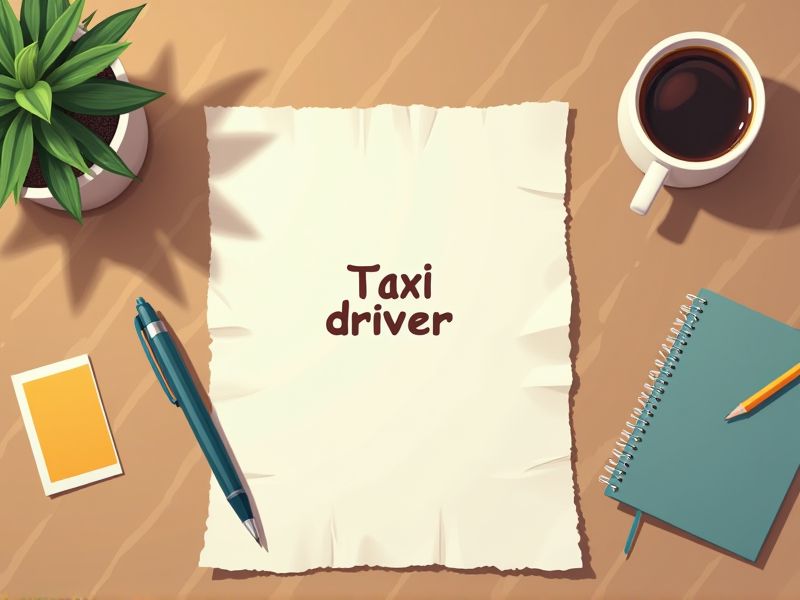
Taxi drivers require certain certifications to ensure they possess the necessary skills for safe and reliable transportation. These certifications verify a driver's understanding of traffic laws and passenger safety regulations, reducing the risk of accidents and improving public trust. They also help standardize the quality of service across the industry, promoting professionalism. Here are several key certifications essential for becoming a taxi driver.
Taxi Driver License
A taxi driver license ensures that drivers have undergone the necessary training and have the skill set to operate a commercial vehicle safely. It creates a standardized vetting process, which helps in establishing trust between drivers and passengers. Regulatory authorities can monitor and enforce compliance with local transportation laws, minimizing the risk of legal disputes. A valid license also enhances public safety by confirming that drivers meet specific health and knowledge criteria.
Commercial Driver's License (CDL)
Taxi drivers generally do not need a Commercial Driver's License (CDL) because their vehicles typically transport fewer than 16 passengers. If a taxi service uses a larger vehicle, such as a shuttle that can carry more passengers, a CDL would then be required. Obtaining a CDL involves stringent testing and background checks, ensuring drivers are well-equipped for addressing potential challenges on the road. States may have different regulations, and in some cases, local laws might mandate specific licenses beyond a standard driver's license for commercial driving.
Defensive Driving Certification
Defensive driving certification enhances a taxi driver's skills in anticipating and responding to potential road hazards, reducing the likelihood of accidents. It encourages adherence to traffic laws and fosters safer driving practices, improving passenger safety. Certification often leads to lower insurance premiums, benefiting both the driver and the company financially. It builds public trust, as passengers are more likely to choose a certified driver, perceiving them as safer and more reliable.
First Aid & CPR Certification
Taxi drivers may encounter emergencies involving passengers, making First Aid and CPR certification vital for providing initial medical assistance. Knowledge in these areas can save lives during critical moments, enhancing passenger safety. Certification demonstrates responsibility, potentially increasing passenger trust and satisfaction. In emergency situations, quick and informed action by the driver can significantly impact outcomes before professional medical help arrives.
Road Safety Certification
Road safety certification reduces the risk of accidents by ensuring taxi drivers are equipped with the latest driving techniques and safety knowledge. It ensures compliance with regulations, promoting a culture of responsibility and accountability among drivers. Passengers feel safer and more confident in their journey when they know their driver is certified. Insurance costs could decrease for both drivers and companies due to a lower incidence of claims, benefiting everyone financially.
Local Area Knowledge Certification
Local Area Knowledge Certification ensures that taxi drivers possess a thorough understanding of the city's geography, leading to efficient route planning and reduced travel times for passengers. Familiarity with key landmarks, traffic patterns, and potential hazards enhances overall passenger safety and satisfaction. Certification serves as a benchmark for professional standards, boosting public trust in the taxi service. Implementing this requirement helps minimize the number of customer complaints due to drivers being lost or unfamiliar with the area.
Alcohol and Drug Awareness Certification
Taxi drivers often face situations where understanding the impacts of alcohol and drugs can directly influence passenger safety. Certification equips them with the knowledge to recognize impairment signs, reducing the likelihood of accidents. Increased awareness aids drivers in making informed decisions, promoting a safer environment for both drivers and passengers. Regulations frequently mandate such certifications, ensuring that drivers uphold public safety standards.
Customer Service Training Certification
Taxi drivers who obtain Customer Service Training Certification often experience improved communication skills, resulting in higher customer satisfaction rates. Enhanced problem-solving abilities lead to more efficient handling of passenger complaints or concerns, which can positively affect repeat business. Certified taxi drivers tend to have a deeper understanding of cultural sensitivity, fostering a more inclusive and welcoming environment. Data suggests that drivers with certification frequently secure better reviews, contributing to reputation enhancement and potential income increase.
Vehicle Maintenance and Inspection Certification
Vehicle Maintenance and Inspection Certification ensures that a taxi is in safe operating condition, reducing the likelihood of accidents. Improved vehicle reliability increases passenger trust, leading to a stronger reputation and customer retention for the driver. Certification identifies potential mechanical issues early, which helps minimize costly repairs and operational downtime. Compliance with legal requirements avoids fines and potential loss of the ability to operate legally as a taxi driver.
Driver Fatigue Management Certification
Driver fatigue management certification is crucial for taxi drivers as it enhances their ability to recognize and mitigate signs of fatigue, reducing accident risks. Training in fatigue management improves overall safety for both the drivers and passengers by minimizing drowsy driving incidents. Certified drivers could see increased trust from passengers, potentially leading to higher customer satisfaction and loyalty. Employers may also experience lower liability and insurance costs due to reduced accident claims associated with trained drivers.
Summary
When you choose a certified taxi driver, you can expect higher safety standards due to their advanced training. Taxi drivers with certifications often demonstrate better knowledge of local traffic laws, enhancing your overall travel efficiency. Certified drivers are usually more skilled in customer service, improving your ride experience significantly. Access to certified drivers can lead to increased trust and satisfaction, encouraging you to use taxi services consistently.
